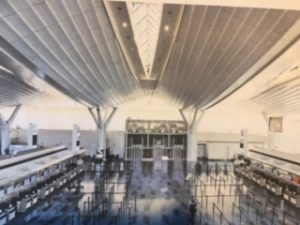Plague Journal, Shizuka

In my early 20’s I lived for several years in Tokyo. One of my first memories of that very big city was a visit to a coffee shop. The place was small, just a few tables, as are most such places in big cities. Located below grade in a basement, it was dark, haze filled, and featured music by local artists. Live music and coffee are a couplet in any country, and in any language. I remember vividly a solo male artist, guitar in hand, intense, violent

strokes, his hand strumming the acoustic instrument. He sang passionately, with a raw wailing voice, a tune that had to be his own composition. I remember the title line: Shizuka da na.
In English it means “silence, yeah!”
I understood the succinct, bullet-like syntax to be an ironical statement, given the point of view of most students, and the coffee shop ethos of the time. The song was a radical criticism of the hubbub, the hurly-burley of commerce

that makes up the big cities such as Tokyo, and modern society in general. The word “shi-zu-ka” literally means silent, quiet, gentle. It is a beautiful, poetic word; the very obverse of a capitalist society, tawdry, noisy with conflict, brazen-faced of its winners and losers.
The New York Times Sunday edition had a section comprised of photographs entitled, THE GREAT EMPTY. The photos by Times photographers record the effect of quarantine on public places around the

world. I was so taken by the photos, that I read nothing else in yesterday’s issue of the newspaper. I’d like to share some of them with you, with the help of my iphone. Places where in normal circumstances you’d find the din of commerce are quietened by the virus.
In my opinion, societies/economies built upon the violence of capitalism are inherently fragile, like a house of cards. Our global way-of-life will not long withstand such an assault upon the normal flow and dynamic of society itself. There is no “lesser of two evils.”
The United States tried to build ventilators years ago. It failed.
Public health officials have known for years that the United States lacked enough ventilators, making the nation vulnerable to a pandemic. The government sought to address the issue 13 years ago by building a fleet of inexpensive portable devices that could be used in a health crisis.
It failed.
Despite a budget and federal contracts, the marketplace ultimately killed the effort. The small California company hired to design the ventilator was acquired by a multibillion-dollar conglomerate in 2012 as the medical device industry was undergoing rapid consolidation.
But government officials suspected that the acquiring company, Covidien, had bought the device maker to prevent the introduction of a cheaper machine that would undercut its existing ventilator business. After the takeover, executives said the project was insufficiently profitable and wanted to terminate the contract. The government acceded and in 2014 awarded the business to a Dutch company.
According to a spokeswoman at the department of Health and Human Services, the new ventilators are on their way. “We are expecting them soon,” she said.
— New York Times, March 30, 2020